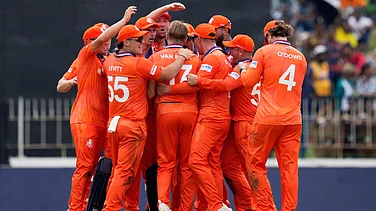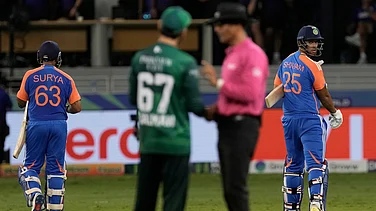Ranjitsinhji was the first over a century ago. Anil Kumble, Manoj Prabhakar and Javagal Srinath are the latest. Indian cricketers have long desired to play abroad to seek, if not exactly fame and fortune, at least some extra pocket money. Of course, Kumble's reported fee of 25,000-30,000 pound sterling (Rs 12.5-Rs 15 lakh ) for his one year stint with Northamptonshire is more than just loose change. But while the focus may still be on the glamour boys, a number of sportsmen from across the spectrum have begun looking beyond the horizon as Indian sport takes on an increasingly high profile.
No longer is the average Indian sportsman satisfied with a cushy bank job.
Table tennis, athletics, hockey, volleyball, squash and tennis are among the sports that have seen a recent migration of players to greener pastures abroad. And what with the cash returns on the national circuit in these disciplines being not much more than peanuts, even contracts worth a couple of lakhs look substantial.
A case in point is table tennis. Players have to travel to remote parts of the country to earn ranking points, but not the greenbacks. Whatever prize money events existed till recently have all but died out.
Little wonder then that both Sujay Ghorpade and Chetan P Baboor, one a former National champion and the other who till three years ago was still in the 'promising youngster' category have bagged contracts to play in the Swedish league.
Baboor's stint with BKT Enig club meant that he would have missed the Asia Cup championship which was to be held in New Delhi from November 28 to 30. However, the Table Tennis Federation of India postponed the event, partly because of the absence of Baboor and Sridhar Raman, another former National champion who has a contract with British Fuels Limited in the English league.
The Indian hockey team which recently won the Sultan Azlan Shah Cup in Kuala Lumpur, Malayia, was without some familiar faces. And not only because of the selectorial whims of the Indian Hockey Federation. Star forward Dhanraj Pillay is currently in Lyons, France. Jude Felix is in Singapore where Mukesh Kumar and Rajnish Mishra will also be turning out for clubs next year, reportedly at $2,500 (Rs 87,500) a month for four months—all expenses paid. The lure is obviously too great for many who would have been eking out a living in India.
Not all emigrate for the money alone. Jagbir Singh was dropped after the Barcelonia Olympics three years ago on 'disciplinary grounds'. Today, he plays for Stuttgart where he was second top-scorer in the German league last season. No wonder German journalists repeatedly grilled Indian team officials about his absence from the recent Champion's Trophy in Berlin.
Ajitpal Singh, the man who led India to the 1975 World Cup triumph, welcomes this trend, though he feels the standard in Singapore and Malaysia is not as high as in European countries. Now a national selector, he feels that hockey players also deserve their share and should be able to earn a little extra money like other sportsmen. “But while they should be allowed to play abroad in their free time, the players should also look to the national interest first and be available for the team in international tournaments. ”
Manjit Dua agrees. The former national table tennis champion and national coach recalls how he flew back from West Germany at his own expense to play in a series of 'tests' against a visiting Japanese team. That was in 1980 when he was playing for the Kronshageggen club in Kiel on a 'no-profit, no-loss basis'. After winning 17 of his 18 matches, Dua was able to demand $1,000 a month the next year, a princely sum in those days.
Cricket remains the sport which has the largest number flocking abroad, spending their summers in England. Not since the hey-days of the '70s have so many been seen in action for county sides. Anil Kumble, Javagal Srinath (Gloucestershire) and Manoj Prabhakar (Durham) all turned in fine performances, Kumble being the only bowler to top 100 wickets in the season. In addition, Srinath was top of the limited-overs bowling averages.
But it is the leagues that are packed with players from Asia. The answer could be financial, according to Unmish Parthasarathi, a junior state and zonal player from Delhi who played for three seasons in England from 1987 to 1992. “Indians and Pakistanis come cheap which is why they are so popular, particularly in the North where they want value for money. Further, Pakistani batsmen are aggressive by nature and this is useful while chasing batting points or going for an early declaration. ”
Former Test fast bowler Raju Kulkarni is another who had a long stint in the UK, playing for English and Scottish teams from 1981 to 1992. Both Parthasarathi and Kulkarni believe the constant pressure on the club pro to deliver the goods match after match is a good learning process for any cricketer. With each county allowed at least one league of its own and the bigger ones like Yorshire and Lancashire having three each there is ample scope for Indian players to earn a bit on the side and gain invaluable experience at the same time.
There was an unofficial ban on Indian players a few years ago with the Board of Control for Cricket in India calling back its players before the end of the English season for conditioning camps and trial matches. Even Tendulkar was not spared when he played one season for Yorkshire in 1992, having to break off his contract at a crucial stage of the season to appear in a 'trial match'.
Kulkarni feels this created a bad impression. “The clubs claim they do so mcuh for the player and then to have him pull out just as the season is approaching its climax is unfair. Word spread fast about Indian players being unreliable. But the situation has improved and they are now able to complete their contracts. ” Indians now in the leagues include Samir Dighe, Sanjay Manjrekar, Amol Mazumdar, Jatin Paranjpe and Zubin Bharucha.
An even more lucrative opportunity has opened up with the emergence of the United Arab Emirates team which qualified for next year's World Cup after winning the ICC Associate Members mini World Cup in Kenya. Except for the captain, the team is made up entirely of expatriate Indians, Pakistanis and Sri Lankans who moved to Sharjah and Duab to play for local clubs and then stayed on. These include former Bombay opener Riaz Poonawala who came close to selection for the Indian one-day team and now opens for his adopted country.
A number of Indian tennis players are settled in the US, earning a good living as coaching pros with the numerous posh country clubs around the country. Some like Mahesh Bhupathi, current Davis Cup player, are on scholarships. Former National squash champion Adrian Ezra studies and plays in the US while women's champion Misha Grewal jahangir has shifted her base to Dubai. Misha was on the verge of quitting the game because of the lack of sponsorship. Since moving to Dubai she is working as a financial analyst with a company set up by Quills Advertising tournaments abroad. Hurdler Rajeev Balakrishnan and sprinter Zenia Ayerton are also on sports scholarships in the US.
Apart from Grewal Jahangir, the country's only other full-time professional sportswoman is golfer Simi Mehra. The 23-year-old just failed to make the cut for the elite and highly profitable US Ladies PGA circuit, but has made an impact on the Future's Tour. Mehra has, however, indicated that the gruelling schedule of 26 weeks of playing and travelling had taken its toll and she may not return next year.
German clubs are said to have evinced an interest in teenage footabll sensation Bhaichung Bhutia. The Indian vice-captain has also been approached by clubs in the Gulf. He could perhaps learn a lesson or two from the Nigerian Chima Okerie who made such an impact in Calcutta a decade back and subsequently moved to England to try his luck. Okerie was a victim of an unscrupulous agent and left high and dry.
A disturbing trend is the departure of a number of well-known footballers to join their families in the US, UK or Canada. In these cases it is to earn a living, often through manual labour, rather than for pursuing the game abroad. But football seems to be an exception.
No badminton player has been able to match the achievements of Prakash Padukone who won the All-England title in 1980. Padukone subsequently turned pro and moved to hvidore club in Copenhagen, where he played from 1980 to 1986. “Financially it was a good deal. But other Indian players will get similar offers only if they reach a certain world standard which none of them has managed since,” he says.
Dua for one, is unhappy with “the cavalier attitude” of the current generation, hinting darkly about players going abroad for matters other than sporting. But as long as the money is good and the opportunities endless, this aspect of the Indian diaspora is sure to continue unabated.






















